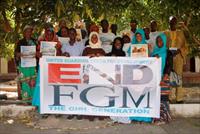United Guardian Youth for Development (UGYD) is intensifying its effort to end the practice of Female Genital Mutilation (FGM), a traditional practice performed on girls and women.
United Guardian Youth for Development won a grant of $9,062.00 (D404,800) for a six-month project from The Girls Generations to serve as a sequel to the recently concluded project on the familiarisation of FGM laws to people.
FGM is practiced around the world and it is estimated that around 120 million females have had it performed on them.
According to experts, female circumcision has less to do with religion and more to do with African culture.
In The Gambia, the practice of FGM has traditionally been conducted in a context of secrecy, and excision is seen as giving power to girls in their rite of passage into womanhood.
In 2015, The Gambia’s parliament passed a bill criminalizing FGM, and set penalties of up to life in prison for offenders of the new law.
Abdoulie Singhateh, Secretary General of UGYD, said his association was able to input activities in Upper River Region and has the will to replicate it in communities of the Lower and Central River Regions.
“This is a follow up to the feedback from many during the implementation of the previous project,” he declared.
He added: “We want to continue to engage the students, women “kafoos”, community leaders, religious leaders and “nyansibas” on the laws, through drama, training workshops, poetry competition, radio airtimes and radio jingles.”
He said as part of activities, they would visit these two regions and organise a two-day Bantaba for students and young people in the communities.
He pointed out that there would also be nights of activities where community elders and “nyansibas” would have sessions with the objective to pass moral lessons to the younger generation without harming them.
He indicated that a regional drama, debate and poetry competition in Lower River Region would also be organised targeting junior schools on the theme ‘’Ending FGM in a Generation."
Students would use their innate potentials to express the harmful effects of FGM at the same time suggest solutions.
He noted that the project would also train 30 journalists on the issues of FGM, especially the harms associated with it to better enhance their understanding and capacities in reporting on it.
Radio sensitisation would remain a key priority for the project activities to get to the masses on the harmful effects of female genital mutilation and the laws prohibiting it, he added,
“We intend to have twelve radio programs during the project for a period of six months and we shall have one in each month,” he said.
Author: Sulayman Ceesay

